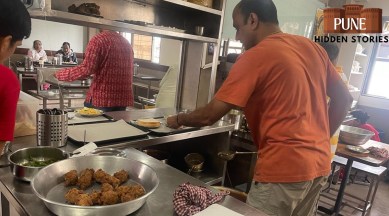Click here to join Express Pune WhatsApp channel and get a curated list of our stories
How a risk-taker and his determined wife pioneered one of Pune’s oldest misal houses
Srikrishna Bhuvan in Pune’s Tulsibaug stands testimony to Yashwant Joshi’s dream and his wife Sushila’s resilience. Built in 1941, it draws around 400 diners every day and is considered one of the most important restaurants in the city.

In 1936, Yashwant Sitaram Joshi had to make a decision – he could go on living at his family farm in the Konkan, where coconut, betel nut and rice grew in plenty, or undertake the challenging task of moving to Pune to start a business in food, of which he knew little. Yashwant’s household and the relatives of his wife, Sushila Joshi, added weight in favour of farming.
Srikrishna Bhuvan in Tulsibaug stands testimony to Yashwant’s decision. He was 22 when he sold his fields and took the bus to Pune. It was a time when young men were coming to the city with dreams of building businesses. “In the Konkan, we worship Parashuram. The people from the region, especially the elders, are canny, hardworking and have sharp business minds. We are adamant about dreams, ethics and maintaining high standards,” says Atul Joshi, Yashwant’s grandson and the present owner of Srikrishna Bhuvan.
monthly limit of free stories.
with an Express account.
Built in 1941, Srikrishna Bhuvan draws around 400 diners every day and is considered one of the most important restaurants in the city, especially as it created an original form of misal. The history of misal restaurants in Pune begins with the 110-year-old Vaidya Upahar Gruha in Ravivar Peth, whose curry is made with fresh green chillies and is green. Bedekar Tea Stall in Narayan Peth, set up in 1948, offers gravy that is tangy and sweet.
At Srikrishna Bhuvan, which started serving ‘misal-slice’ in 1966, the soul of the dish is the bowl of rassa from which the aroma of coconut arises. It comes with a plate of potato, poha, chivda and onion and is covered in sev. Opposing traditional recipes, Srikrishna Bhuvan’s misal does not include sprouts. The bread slices — not pav — are an ode to the old bakeries of Pune.
The restaurant has been buying bread from Manohar Bakery, established in 1956, for more than 40 years. Some visitors complain that the bread is hard, unlike milk bread. “The idea is that the bread must not become soggy when it is dipped in the gravy. When a person takes a bite, they should not get a tasteless mush. They should be able to enjoy the crust,” says Atul.
Though the restaurant has gained fame, the stories of its founders have faded. Few loyal clients are aware that Yashwant took up a job at his uncle’s restaurant after arriving in Pune. The restaurant was near Apollo Talkies, a 60-year-old single-screen cinema in Rasta Peth, and he was the manager who also did every kind of work for three years before he thought he was good enough to start out on his own.
In Yashwant’s time, the peth areas made up the city, and the marketplaces of Tulsibaug and Mandai, among others, used to be bustling through the day. Srikrishna Bhuvan would roll up its shutters at 4 am, and traders and labourers from the marketplace and farmers used to come for poori-bhaji, milk tea, laddoos, shankar para and other traditional Maharashtrian snacks.
Yashwant lived four years after starting the restaurant, leaving his wife to carry forward the business. “My grandmother was an aggressive woman. She used to go to movies alone, which was unconventional at the time,” says Atul. Sushila, who had a 10-month-old son, used to start cooking while it was still dark outside so that early customers had fresh food. Throughout the day, kettles of tea used to be sent out to Minerva and Aryan Talkies, popular cinemas of the time that no longer exist. “During this time, it was not considered respectable to visit restaurants. If a person went to a restaurant, he was considered a bekar aadmi (useless man),” says Atul. After two years, Sushila opted to raise her son in their village and left the restaurants in the hands of her brother, Parshuram Vidhwans.
It was in the 1960s that Sushila’s son Sudhakar Yashwant Joshi took over the reins of Srikrishna Bhuvan. An innovative cook, Sudhakar created the misal recipe. “He taught the recipe to a lot of people, but nobody has been able to recreate the taste. It is a simple set of instructions, but cooking it is just as difficult,” says Atul. Sudhakar was prolific in the kitchen and created a menu that included idli, onion fritters that were perfect balls, buttermilk and sheera, among others, most of which are served even today. In the 1980s, Sudhakar visited the US and planned to open a restaurant there. He passed away in 2010, instructing his son and heir to “never compromise on quality and to travel widely”.
Atul entered the business in 1998 just as the post-liberalisation food boom brought foreign flavours to the country. He responded by staying firm with the Maharashtrian menu and constructing the present building, with the dining space on the first floor.
In 2010, Srikrishna Bhuvan took the bold step of banning plastic. Now, one can see rows of people waiting with containers for their misal. “We didn’t lose business. We just didn’t increase it. If we had allowed plastic packaging, we might have 30-40 per cent more clientele,” he says. It has been an unusual business decision. “No, it is a progressive one because plastic is harming the environment,” says Atul. His grandfather would have approved.
Click here to join Express Pune WhatsApp channel and get a curated list of our stories